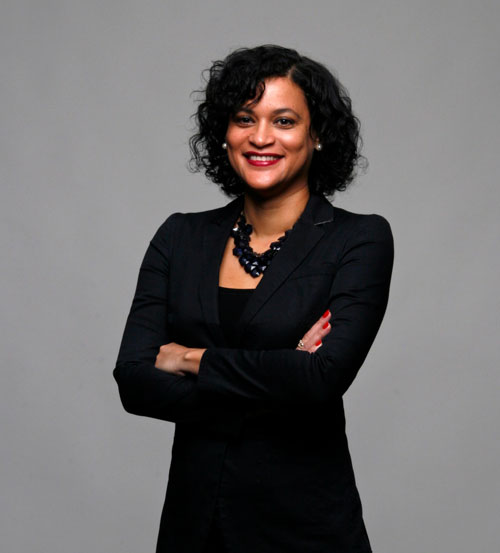PROVIDENCE, R.I. [Brown University] — Since Black resident George Floyd was killed at the hands of a white Minneapolis police officer on May 25, millions of Americans have sought to better educate themselves on systemic racism in America and to help fight for change. Many have turned to scholarship for edification. Enter: Juliet Hooker.
Hooker, a professor of political science at Brown University, has for more than a decade specialized in research on race and politics in the United States and Latin America. In recent weeks, her work has received a new surge of national and international attention.

In her 2009 book, “Race and the Politics of Solidarity,” Hooker argued that in countries where racial diversity continues to increase, coming to terms with systemic racial injustice is the key to building equitable, unified societies. In a 2016 study published in the journal Political Theory, she presciently revealed the racist bias hiding in comments criticizing Black-led protests, from the marches of the Civil Rights Movement to today’s Black Lives Matter rallies, for being too violent or too radical. And in 2017, she described the phenomenon of “white grievance,” an increasingly popular right-wing opinion that societal gains for non-white Americans lead to losses for white Americans.
Hooker shared insights about her research, the resurgent Black Lives Matter movement, lessons learned from the Civil Rights Movement and more.
Q: An essay you wrote in 2016, “Black Lives Matter and the Paradoxes of U.S. Black Politics,” has been thrust into the national spotlight. What has it been like to see your work resurface in such a major way?
A colleague joked to me that I need to start researching universal peace, because I seem to be calling things into the universe with my research. It’s been both a lot to process as well as hopeful to see so many people mobilized in favor of racial justice. I’ve been writing about the Movement for Black Lives for years, but as many know, the movement had fallen off the national stage during the Trump administration as so many other crises arose — even as local BLM organizers continued to draw attention to issues of race. The ways in which recent events have shifted debates that seemed to be locked in stalemate has been really something to witness.
I’m also currently working on a book about political loss and democracy, and it looks at racist monuments and how they shape the political imagination. I was in the middle of writing about Confederate monuments that didn’t seem like they would come down anytime soon — but some of them have. It’s a dizzying time of political transformation.
Q: Could the recent shifts in perspective could lead to major change?
I think the shift could potentially lead to transformation, but it’s also a dangerous moment. Historically, when you have moments of racial progress, they’re followed by backlash. So the question is, how much will it be possible to capitalize on these openings and make significant change? We know that a huge pocket of the country is still animated by the politics of white grievance — this idea that a gain for another group of people is a loss for them. The politics of white grievance have been so successfully wielded by President Trump and many in the Republican Party.
I also worry about the fact that this is happening in the middle of a pandemic that disproportionately affects Black people, as well as Latinx and Indigenous peoples. The people who are already suffering from injustice and trying to gain a measure of justice for all the harm they have suffered make up many of the people who are out in the streets. They are literally putting their lives on the line in more ways than one.
I do feel hopeful seeing a recent shift in attitude among so many white Americans, especially young people. A few years ago, public polling showed there was much less support for the Black Lives Matter movement, and for the idea that Black people still suffer from racial discrimination. Now, the majority of Americans support Black Lives Matter. It’s been interesting to see how much white public opinion has shifted since May.
Q: Why do you think public opinion shifted so radically in the wake of George Floyd’s murder, when we’ve seen so many other horrific incidents in the years prior?
I think it’s not coincidental that this awakening is happening in the middle of a pandemic. The pandemic exposed the fact that people across gender and racial and class lines were experiencing various kinds of loss. They lost their jobs, their loved ones, maybe even their own lives. I think it got people thinking: Are there ways in which changing certain structural inequalities could actually benefit everybody?
Think about essential workers. They are overwhelmingly women and people of color. They have been underpaid and undervalued for years doing what has now been revealed as essential work. It’s gotten people thinking, okay, what if we shift our priorities to place more value on this work by paying workers accordingly and giving them the societal recognition they deserve? Even when we’re not in a pandemic, that’s not simply going to help those workers — it’s also going to make our whole society better, because those who depend on their work can continue to live comfortably thanks to them.